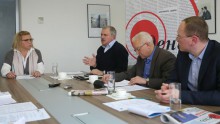In the year of its 25th anniversary, Ukraine is still beset with many unresolved problems, which have resulted in dire consequences. State-building difficulties haunt this country like chronic ailments year after year. A multivector approach and personal interest, an old attitude since Kuchma’s times, has in fact led to the absence of a clear strategy of development, which many put down to the absence of political will. The war has proved that it is a vicious approach, but it failed to break the deep-seated clan ties, including those between Ukrainian and Russian “families.” The proof of this is the recent visits of Kuchma to Yekaterinburg and of Gryzlov to Kyiv. Ukraine enters 2016 with a burden of unresolved problems, which more and more raises a question: is this country able at all to change for the better with the existing political “elite”? Den invited some well-known experts to a roundtable, “2016: the Time of a Total Revision of Problems and Challenges,” to analyze the historical path since 1991, which has led to the war. Among our guests were Andrii SENCHENKO, Member of the Ukrainian Parliament of the 5th-7th convocations, chairman of the coordination board of the all-Ukrainian civic movement “The Power of Law”; Volodymyr VASYLENKO, a judge at the International Criminal Tribunal for the former Yugoslavia in 2002-05; and political scientist Mykhailo BASARAB.
SENCHENKO: “TODAY, IN THE 25th YEAR OF INDEPENDENCE, WE CAN SPEAK OF AN ACUTE POLITICAL CRISIS”
Ivan KAPSAMUN: “2016 is a significant year for Ukraine – we are marking the 25th anniversary of independence in August. Unfortunately, we can see today that this country has lost some territories, suffered thousands of casualties, and has serious problems with the economy. To what extent do you think our state is independent?”
Volodymyr VASYLENKO: “In this case there can be a lot of complaints about the Ukrainian leadership, for its domestic- and foreign-policy course not always meets the needs of society and is not always aimed at serving Ukraine’s vital interests. As for Russia’s aggression against Ukraine, too little is being done for our country to be up to the mark and be able to adequately defend its independence. The method of repulsing the Russian aggression chosen by the president and the government is beneath criticism. Russia is committing armed aggression against Ukraine in the shape of a hybrid war, but, instead of martial law, a hard-to-grasp ‘ATO regime’ was imposed.
“It is crystal clear that the goal of the Russian leadership and establishment is to finally destroy Ukraine as a nation, a state, a subject of international law, and a political reality. This should be the basis for mapping out our domestic and foreign political strategies. I am firmly convinced that Russia would have never committed armed aggression against Ukraine if the Ukrainian leadership had pursued a Ukraine-centered humanitarian policy since an independent state was restored. It is the absence of this policy that laid the groundwork for separatism, provoked treason on the part of the police, army, and security service, and eroded unity in society.”
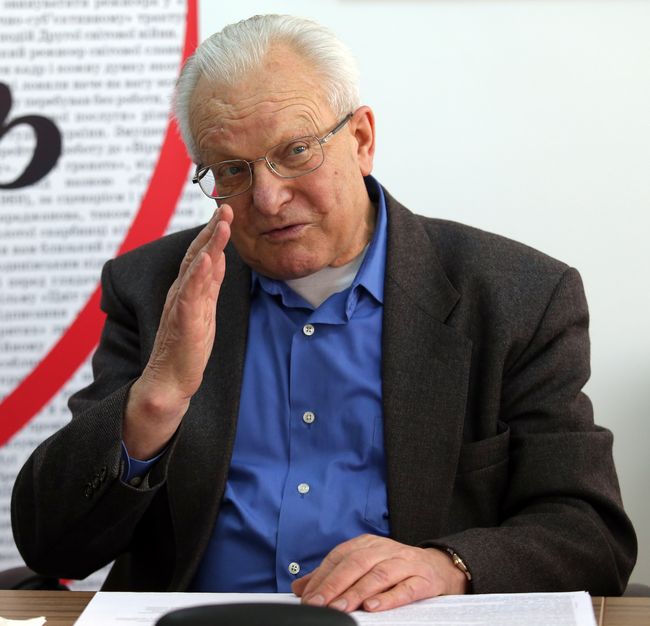
Andrii SENCHENKO: “It is good that we have learned to buy gas in Europe and no longer buy electricity in Russia. But have we managed to carry out an energy-saving program, encourage the extraction of our own gas, increase electricity generation, and cut expenses at the same time? No. The impression is that we seem to be free, but in reality our strength drastically weakened. A country can only be independent when it is strong, and the government should care daily about this matter. But it is not doing so.
“Politically, although Russia controls the occupied Ukrainian territories, we have become more independent. But, due to the weakness, inconsistency, and corruptness of our authorities, the country has come under the influence of such foreign entities as the IMF, the US, and the EU. They are charting a course for the Ukrainian leadership without having sensors that measure the temperature of society. This reduces the Ukrainian state’s degree of firmness. What obviously did not contribute to firmness was invitation for foreigners to hold political offices rather than play the role of advisors. It is the height of absurdity.
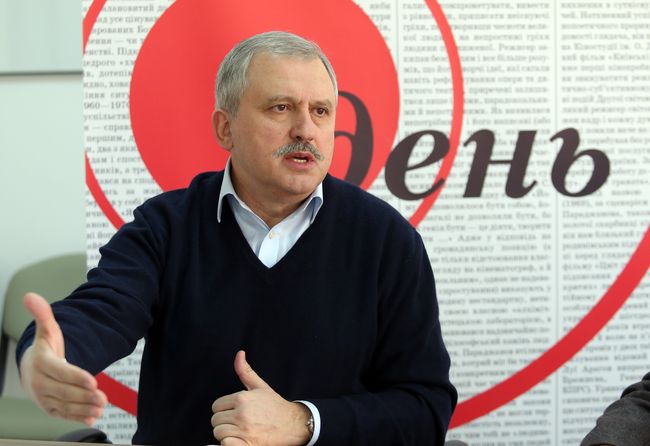
“Today, in the 25th year of independence, we can speak of an acute political crisis.”
V.V.: “What we have in reality is a crisis of power. It is wrong to say that we have a crisis of the state, for it is a technique aimed at shaking the confidence of Ukrainians in the state.”
A.S.: “There is also a problem with the voters who elect the government. For in reality there were enough indications before the elections that the president, the premier, and their inner circle were running for power in order to live in the old, rather than a new, style. Nevertheless, most of the Ukrainian citizens preferred to believe in a miracle – so Poroshenko became the president.
“Today, there are no systemic juridical efforts at all to protect the interests of our country and its citizens. Recently we saw publication of the ‘Integrated State Program for the Support, Social Adaptation, and Reintegration of Ukraine’s Citizens who Have Resettled from the Temporarily Occupied Territory of Ukraine and the Counter-Terrorist Operation Areas to other Regions of Ukraine, for a Period until 2017.’ The program calls for working out methods to assess the losses inflicted on the citizens of Ukraine as a result of hostilities and to compensate them for these losses from Ukraine’s state budget. Our state must help people, but this should be called target-oriented payments, not compensation, because compensation must be paid by the one that inflicted losses, i.e., the aggressor state. This is why we need a juridical program to document and sue for the losses – the ultimate aim is to take consolidated legal actions and force Russia to pay.”
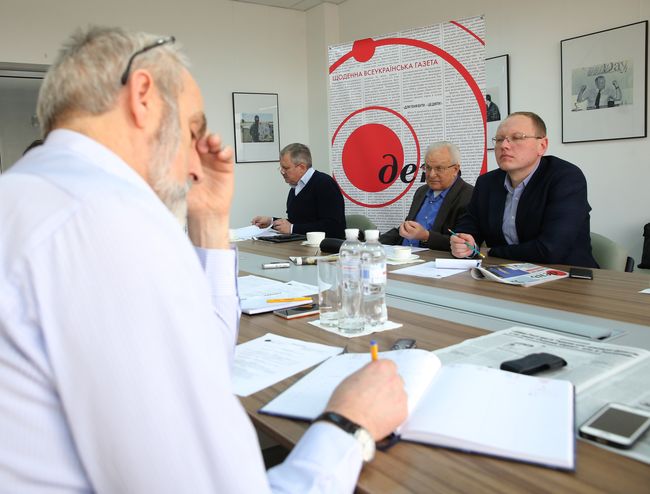
VASYLENKO: “UKRAINE DOES NOT STILL HAVE AN AGENCY TO DEAL WITH PREPARING A CONSOLIDATED CLAIM AGAINST RUSSIA AS AGGRESSOR”
Valentyn TORBA: “What is this: incompetence or personal interest of certain individuals?”
V.V.: “Studying the legal side of and the Ukrainian leadership’s attitude to handling these problems, I saw colossal juridical incompetence. Take, for example, the problem of making up the losses inflicted by the Russian aggression. I have long proposed passing a framework law that sets out criteria for assessing these losses. We need a law on the basis of which we could assess the total damage.
“Ukraine does not still have an agency to deal with preparing a consolidated claim against Russia as aggressor state. It is necessary to draw up, systemically and in a proper juridical shape, all the documents that prove the very fact of aggression, on the one hand, and show, on the other hand, the total damage inflicted on Ukraine by the armed aggression as well as details of the suit Ukraine will file against Russia. The consolidated document must be submitted to the UN so that the international community comes to know the facts that confirm Russia’s aggression against Ukraine.”
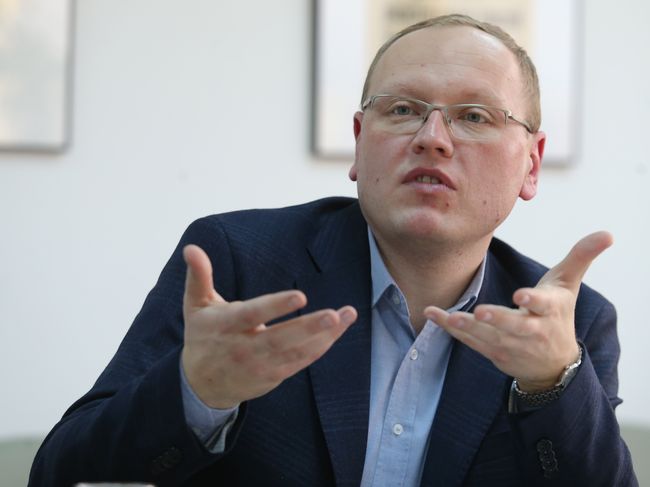
Mykhailo BASARAB: “To understand the current situation and the particularities of Ukraine’s political class, one should look back on the early 1990s, when Ukraine became independent. Since then, the state has gone through three crucial stages.
“Two decades ago, Ukraine emerged as a postcolonial state whose largest part had long been dominated by the Russian Empire. Unfortunately, Russia still has a considerable impact on our domestic policy via its agents. In the 1990s, Ukraine, in contrast to some of our Eastern European neighbors, did not fully go through the process of resetting. I mean what Europeans call lustration. We needed not so much Eastern-European-type lustration as decommunization. Representatives of the Soviet communist elite, who had depended on Moscow party bosses and especially on the KGB, remained behind on key positions in the independent state. When independence was proclaimed in Ukraine, no parliamentary elections were held and the communist majority stayed on at the Rada and gained some time to adapt. Russia and its puppets in Ukraine won time to transform in the new realities. The second president, who served two terms, represented the former Soviet industrial nomenklatura. At the same time, the new elite composed of communist-era dissidents was rapidly carrying out reforms in Eastern European states.
“We had another chance in 2004. Much to our regret, there was no systemic reset again. The Orange Revolution was immediately followed by constitutional sabotage, the fruits of which we are still reaping today. This was done intentionally in order to unbalance the powers of governmental institutions. It was also a mistake not to hold parliamentary elections right after the revolution, and pro-Russian oligarchs and politicians had again enough time to stay on in the reference frame and get a chance for a revanche, which eventually occurred in 2010. In 2004, those who had violated the election law were not prosecuted, there was no onslaught on corruption, and the clout and potential of oligarchs remained intact. Obviously, it was by and large the fault of a weak president.
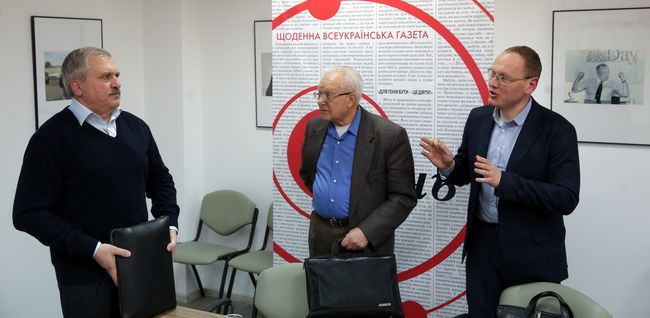
“Now that we have opened the window of opportunities for radical and systemic changes for a third time, we can see again that, owing to the president’s weakness and unfitness to deal with the circumstances, the Ukrainian state is not being strengthened to resist the aggressor and there is no full-scale attack on corruption. In addition, we can see the never-ending process of constitutional changes, which hinders the branches of power from striking a balance. In these conditions, we cannot begin to form a lasting tradition of formal relationships inside the political class. This is another factor that promotes corruption and abuse of power. There are no constructive mechanisms for riding out a political crisis.”
V.V.: “A systemic reset of the government and radical changes in Ukraine can occur if there is a qualitatively new parliament. This can only occur if a proper Election Code and an anti-election-rigging system are adopted. The Coalition Agreement comprises a commitment to make a new election law. There were good chances to do so, but the key political players do not want it for fear of losing control over the Verkhovna Rada. They form parliament and try to write a Constitution to serve their own interests. But our problem is not in the quality of the Constitution but in the quality of the ruling elite which does not wish to observe it.”
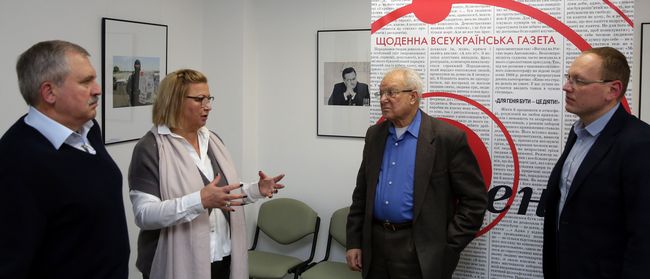
BASARAB: “AS LONG AS WE DON’T HAVE A LEADER CAPABLE OF CUTTING GORDIAN KNOTS, WE WILL BE BESET WITH PROBLEMS”
M.B.: “It is worthwhile in this case to speak of the quality of political leaders. Today we nominally have a parliamentary-presidential republic, but the president has taken on the first role. This means that in Ukraine there is no adequate structure of the balance of powers. Relations of subordinations are formed according not to powers held but to personal perseverance of one official or another. The judicial system is spoiled by corruption. It is in these conditions that a strong leader may emerge. Whenever we try to seek ways to solve serious institutional problems and eradicate the omnipresent corruption or speak of defense against Russian aggression, we must turn, above all, to the president. As long as this office is not held by a strong leader, a person capable of cutting many intricate Gordian knots and defending, seriously and consistently, the national interest, we will be beset with problems.”
A.S.: “I don’t believe that we will ever win at presidential election roulette. Ukrainian society will inevitably understand that it is necessary to change accents in the Constitution and establish a true parliamentary-presidential republic. The president should be stripped of some of his or her powers. But a juridical ‘amputation’ will not eliminate a number of problems. For example, the president has misappropriated the right to determine by decree the composition of national regulators. This flatly runs counter to his constitutional powers which are clearly defined and are not subject to extension.”
V.V.: “Maybe, it will be possible to get down to ‘amputating president’s powers’ at a later stage, but now it is not the right time. It is necessary now to pass a law on presidential impeachment. The president must have serious powers, but he must also know what will await him if he abuses them.”
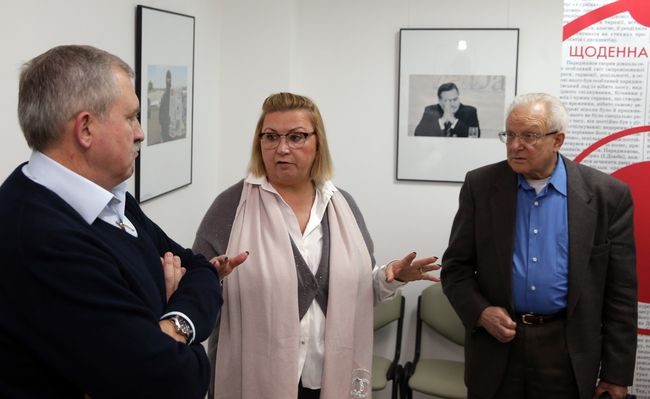
M.B.: “It is difficult to imagine in the current situation that parliament can be an agent of systemic changes in the state. A debate on the new Constitution is in the offing. Some preparatory processes are already underway in various milieus, also with the participation of oligarchs. I am sure there will be attempts to establish the parliamentary-presidential or even parliamentary form of government. It is an absolutely wrong way. Parliament is an ideal place for big capital owners to reach a consensus. It is sort of a collective irresponsibility corporation. Every oligarch is a majority or minority shareholder. Of course, the president can also depend on oligarchs or be one of them, as is the case today. But if Ukraine is destined to undergo the process of fast radical changes, a strong-willed president will undoubtedly become their agent. The president’s absolutism must be checked, if necessary, by a relatively simple procedure of impeachment and a balance of powers, when parliament will have levers to influence a strong president. But I don’t believe that parliament is capable of enacting radical reforms in the current circumstances.”
SENCHENKO: “ONLY THE REACTION OF UKRAINIAN SOCIETY CAN KEEP POROSHENKO FROM CARRYING OUT THE MINSK AGREEMENTS”
Dmytro KRYVTSUN: “January 26 begins the last week of the current session, when parliament plans to finally discuss constitutional changes about decentralization. These changes may result in a ‘special status’ of the Donbas or in fact a ‘hybrid capitulation’ to the external enemy. Can you see any alternative scenarios for Ukraine?”
V.V.: “The question of a ‘special status’ was foisted by Russian diplomats and raised by Sergey Lavrov as far back as March 2014 during his meeting with John Kerry in London. At first, Russia demanded that Ukraine denounce the EU Association Agreement, stop seeking NATO membership, and agree to make constitutional changes that envisage a federal setup and Russian as a second official language. This was soon modified into the formula of a ‘special status’ for the Donbas, which introduces an element of federalism in Ukraine’s political system. There must be no concessions in this case because, strategically, it is a matter of life and death for the state.”
A.S.: “It is not only Kuchma, but also Poroshenko who created the problem of the Minsk agreements. Kuchma is now acting as a cover on favorable conditions – it is perhaps immunity from prosecution over the Gongadze-Podolsky case. The essence of the Minsk Agreements is to get Ukraine back into the Kremlin’s orbit or in fact into Putin’s ‘paws.’ Only the reaction of Ukrainian society can keep Poroshenko from carrying out these agreements. So, it is very important that the media should explain the essence of these deals and the danger of their fulfillment for Ukraine. We must not accept either ‘decentralization,’ i.e., in fact usurpation of power, or the conditions for changing the procedure of local self-government in the Donbas which is in reality constitutional confirmation of the Kremlin’s control over political processes in Ukraine.
“Is there a way out the ‘Minsk trap’? It is a major problem because Poroshenko will be unable to find one in the course of closed-door consultations – he will be put down in a matter of seconds if he tries to do something. As there are no real successes inside the country, there is no tangible support on the part of society. Besides, I think a lot of facts of corruption in the president’s inner circle and in other topmost offices have been documented and can be put on the tables at any moment and used as an argument in a rude way.
“One must seek a way out of the ‘Minsk trap.’ I don’t know how to encourage the president to do so, but the only way is to offer a different strategy, based on the demands of the Ukrainian president rather than on requests or wishes, at a certain public forum. For our state honored the civilized world’s request and gave away the nuclear weapons in exchange for security guarantees. So, we have the right to demand.”
I.K.: “We have the right to demand, but in reality the Americans and the Russians are holding direct negotiations on Ukraine without the Ukrainians. What dangers can await us here?”
V.V.: “In spite of foreign pressure, we should not accept the proposed constitutional changes. Our MPs must take a responsible attitude to this and refuse to vote. These changes have already been voted for – it is a sufficient step that shows that Ukraine is prepared to move on. Now we must stop and demand serious steps in return from the Russian side, such as ceasing fire, withdrawing the Russian armed units and mercenaries from the territory of Ukraine, and restoring Ukrainian control over the entire state border line.”
A.S.: “We have only a week left, so we must clearly define our stand and urge all those who consider themselves patriotic forces in parliament not to vote. In the last analysis, we should try to make society believe that every MP who will vote for these constitutional changes must be ousted forever from Ukrainian politics.”
M.B.: “It is not so much about one Constitutional clause as about observance of the Minsk Agreements, which may help Putin implement his plans to occupy the entire Ukraine. The annexation of Crimea was his personal morbid whim, but the goal of the Donbas invasion was not to add this area to Russia but to reintegrate the temporarily occupied territories ‘with a special status’ into Ukraine and thus introduce a ruinous virus into the state’s body in order to continuously exhaust it.
“Supposedly, Petro Poroshenko was very much interested to see the Minsk Agreements expire on January 1, 2016. It is now possible for the Ukrainian side to offer a new agenda that includes new demands or conditions and to reformat the negotiating process with due account of Ukraine’s interests. The West wants to discontinue sanctions and to see no more uncertainty in the Donbas. The Kremlin is also eager to shrug off the sanction burden. So, the interested parties are open to proposals. But Poroshenko’s silence meets the Kremlin’s interests. When others keep silent, Putin shows initiative. Some said as recently as six months ago that they would not shake his hand. But just a few problems were enough for Europe to sink and flounder in them. Today, there are only two subjects left – the US and Russia – that continue to negotiate on global problems. Ukraine, as a non-independent link in the international reference chain, may become the object of their compromises.
“Today, the refusal to vote for Constitutional changes is an alternative suggestion that will prompt Poroshenko to seek other ways out of this situation. The way out is to recognize these territories as temporarily occupied and Russia as one that is responsible for what is going on there, and to raise claims about the return of these areas.
“I think we should heed the advice Barack Obama recently spelled out on a US TV channel. Asked about the key human feature that leads to success, Obama said: ‘I believe in persistence.’ This is perhaps the feature that Ukraine’s ruling class and our president traditionally lack, if we mean untying the Donbas and Crimea ‘knots’ and, what is more, if we mean national interests.”

